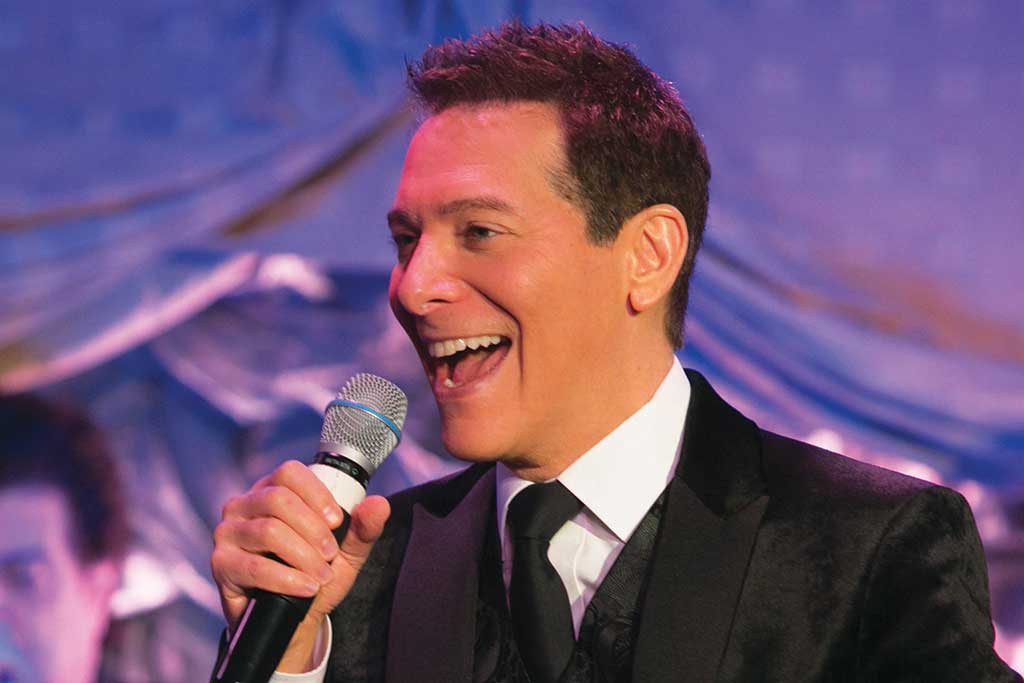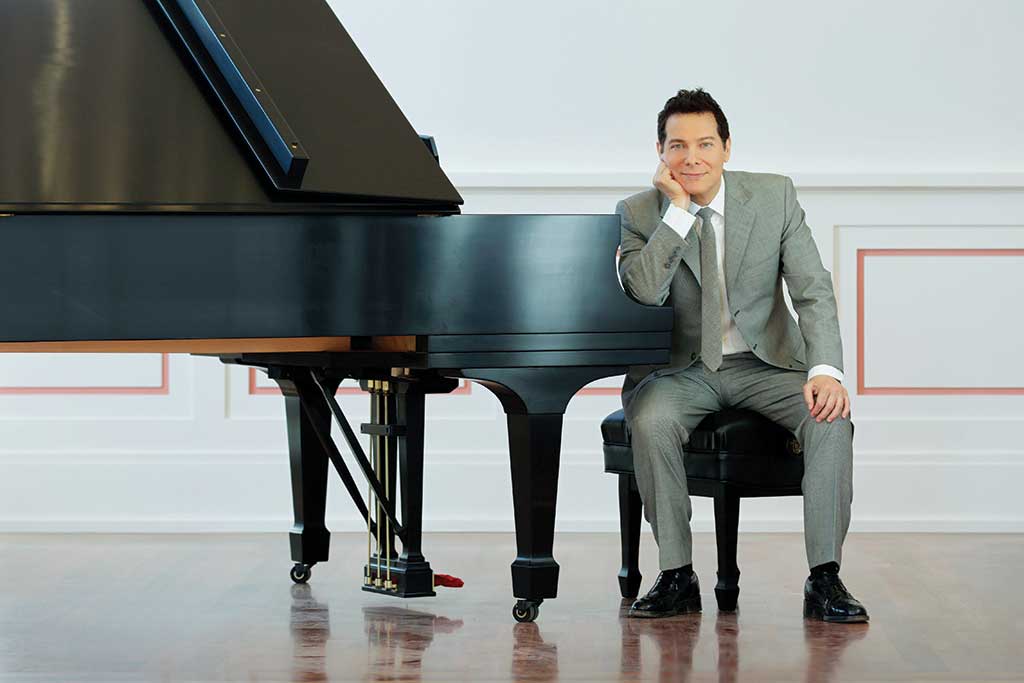Known as “the Ambassador of the Great American Songbook,” there is perhaps no greater advocate for this timeless music collection than Michael Feinstein.
At five years old, Feinstein shocked both his parents as well as himself by playing piano by ear, and there was no looking back as he became increasingly obsessed with the works of Johnny Mercer, Harold Arlen, Burton Lane, and dozens more. By 20, Feinstein left his hometown of Columbus, Ohio and moved to Los Angeles, where shortly thereafter he was introduced to Ira Gershwin, for whom he worked for six years. This mentorship has been the foundation for Feinstein’s expansive, 30-year career in the music industry, during which time he has garnered two Emmy Awards and five Grammy nominations.
Currently, New York City is welcoming his return as one of the city’s most popular night- club venues is renamed Feinstein’s/54 Below (www.54below.com).
“Beloved and respected by his audiences and musical artists around the world, Michael Feinstein is a fantastic performer and synonymous with great entertainment,” says 54 Below Proprietor Steve Baruch. “My partners, Tom Viertel, Richard Frankel and I are honored to begin this exciting new collaboration with Michael adding additional vision and creative energy to 54 Below.”
As part of the new partnership, Feinstein will appear at the venue December 20-30, then he launches his winter/spring tour schedule that includes Naples, Florida, with the Naples Philharmonic (February 19 and 20); Palm Desert, California (March 12 and 13); and a return to New York City’s Jazz at Lincoln Center (April 13 and 14), along with plenty of other performances in between. We caught up with him prior to his reoccurring gig at Feinstein’s at the Nikko in San Francisco to chat about the American Songbook, his charitable organization, and the music industry’s evolution.
How do you define The American Songbook?
It’s ever–evolving. To me, there are songs that have transcended the time in which they were written: the works of Billy Joel, Carol King, etc., are as significant and important as Richard Richards and Hoagy Carmichael. We won’t know until 20 years after a song is written if it will last or not.
Do you think the way we listen to music has changed?
Now we think of a song with a single performance, in the glory days, different people recorded a single song a hundred times. Technology is wonderful, but it has also created pitfalls. Most people listen to music as compressed audio files versus a stereo system. Program notes and liner notes—it was all part of it.

You’ve played spectacular venues around the world, what was the appeal in establishing a long-term relationship with 54 Below?
One of the great things about working in a nightclub is that it refers to a smaller physical space, but what goes on in that space could be anything. It’s as wide-ranging as anything that exists in the arts. The thing that attracts me as a performer is the connection with the audience. It’s up close and live. It’s not filtered. There’s very little technology and no auto-tuning. It is real and of the moment. I’m thrilled to partner with 54 Below and keep this kind of entertainment alive. I don’t do it for the money. I’m lucky at this point in my career to be able to pick and choose what I want to do.
One of the most important things is my work with the Great American Songbook Foundation, which includes an annual competition for high school students. Thousands of kids across the country participate, and I’ll be presenting some of them at Feinstein’s/54Below this December. The foundation is part of the Center for the Performing Arts, where I serve as artistic director. We were looking for a location to establish the foundation and the most attractive offer came from Carmel, Indiana, where the mayor and the community offered staff, office space, and state-of-the-art storage facilities for the collection that made it possible for my organization to kick-start. It’s there because the community supports it.
What do you think makes Feinstein’s/54 Below unique compared to your previous nightclub in New York (Feinstein’s at Loews Regency) or your current West Coast home at Feinstein’s at the Nikko in San Francisco?
Every space has its own personality, it’s odd how all of these mysterious elements come together. Comedians never did well at the Regency! In San Francisco we offer programming that includes a balance of local and other talent. 54 Below is a gorgeous room, and I’m exited to bring entertainers that I’ve worked with like Cheyenne Jackson and Alan Cumming to the space. (Of course, I’m making a presumption that they’ll want to appear!)
We’ll continue to craft the formula that we used at Feinstein’s. A well-trained staff, the way you’re greeted, and the food (I’m vegan so I’m always careful to have a wonderful and eclectic menu)—all of these things contribute to the experience. As far as programming, it will be the best of what they’ve presented and what I can contribute to create a collaborative synergy. We both felt it’d be to our mutual advantage and joined forces. I’m very excited and I’m looking forward to playing twice a year.
How has your musical style developed over the years, and what can we expect to hear during your inaugural engagement this December?
One of the reasons I still have a career is that I’ve reinvented through the years. At first I just played and sang, I never worked with other musicians. Then it was a trio, then a combo…then I started standing and singing, worked with a big band and symphonies, and now I’m conducting. (Feinstein has been the principal conductor of the Pasadena Symphony and POPS since 2012.) There are different ways to propagate the music I care about. Lately I’ve been interested in swing music and style, a contrast to the ballads for which I’m known.
There are also new and fresh ways to interpret classic songs. I’ll find a verse that people haven’t heard or a fresh approach in the arrangement. Perhaps I’ll make harmonic changes. It’s always about pushing the envelope. The December show will be different than anything I’ve ever done. Perhaps a different configuration for the accompaniment or songs that people aren’t familiar with. There is a lot of special material that nobody knows of from composers such as Murray Grand, Stan Freeman, and Billy Barnes. They’re fresh as ever and have a lot of humor, too.

Michael Feinstein Live
Who is piquing your interest in popular music now, and how do you hope to diversify audiences at Feinstein’s/54 Below?
You have to find new audiences and push the boundaries. I want to present young talent and to continue to bring fresh and emerging artists from all different kinds of music. It bothers me that people hear ‘cabaret’ and dismiss it without knowing its rich history throughout Germany and France. They say the word as if it’s an insult when it’s one of the most exciting art forms because anything is possible. Look at someone like Meow Meow, who sings everything from contemporary material to Kurt Weill. She’s a great artist, but it’s also about the greatness of the material. It touches people’s heart and souls in a way that is pertinent for today’s world. There’s nothing more exciting than doing that in an intimate venue.
I hosted a show on NPR called “Song Travels,” and I discovered the music of all these artists with whom I would otherwise not be familiar. Sometimes the genres are different than what I listen to, but one of the things I love about music is that one thing is a bridge to another. There are always connections.


